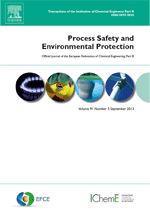 After five years, Elsevier has finally issued a notice of retraction for a paper it announced it was pulling for fraud in 2011.
After five years, Elsevier has finally issued a notice of retraction for a paper it announced it was pulling for fraud in 2011.
All of the papers were produced by a research group in Brazil; all were retracted after the publisher conducted an investigation, concluding that the NMR results had been manipulated. At the time, the last author on the latest retraction, Claudio Airoldi, defended the work. Since then, however, Airoldi has logged two more retractions, bringing his total to 13.
Here’s the full text of the retraction notice, from Process Safety and Environmental Protection:
This article has been retracted at the request of the Editor-in-Chief and Publisher.
This article has been retracted at the request of the Editors of Process Safety and Environmental Protection as fraudulent results have been found in this article and other publications in Elsevier journals by the same authors, namely
–Journal of Colloid and Interface Science 337 (2009) 122–130
–Inorganic Chemistry Communications 12 (2009) 1145–1149
–Journal of Environmental Radioactivity 101 (2010) 122–133
–Process Safety and Environmental Protection 88 (2010) 53–61
–Journal of Physics and Chemistry of Solids 70 (2009) 1413–1421
–Applied Surface Science 256 (2009) 702–709
–Inorganic Chemistry Communications 11 (2008) 20–23
–Inorganic Chemistry Communications 12 (2009) 1107–1111
–Journal of Hazardous Materials 172 (2009) 507–514
–Journal of Hazardous Materials 171 (2009) 514–523
–Journal of Colloid and Interface Science 338 (2009) 30–39
Publication of an article in a peer-reviewed journal is an important building-block in the development of science. Elsevier has defined policies and ethical guidelines that have to be obeyed by authors and editors and Elsevier takes its duties of guardianship over the scholarly record extremely seriously.
The Editors of the Elsevier journals involved found that the allegations of fraud are conclusive and they have decided that these papers should be retracted from the journals.
“Application of modified attapulgites as adsorbents for uranyl uptake from aqueous solution–Thermodynamic approach” has been cited 14 times since it was published in 2010, according to Clarivate Analytics’ Web of Science, formerly part of Thomson Reuters — 11 times after 2011, when Elsevier declared it should be retracted.
In 2011, after the retractions, Airoldi was suspended for 45 days from the State University of Campinas (UNICAMP) in Brazil; his co-author on the 11 papers (and first author on this final retraction), Denis de Jesus Lima Guerra, lost his post at the Federal University of Mato Grosso (also in Brazil).
When we covered Elsevier’s announcement in 2011, we reported:
Airoldi said he stands by the work. He defended himself and Guerra, saying they did “not fabricate the spectra.”
In the interim, Airoldi lost two additional papers — one for reusing text and figures, another for “fraudulent use of several figures from previously and posteriorly published articles by the same authors.”
With this latest retraction, all 11 papers slated for retraction by Elsevier in 2011 have been officially pulled.
Like Retraction Watch? Consider making a tax-deductible contribution to support our growth. You can also follow us on Twitter, like us on Facebook, add us to your RSS reader, sign up on our homepage for an email every time there’s a new post, or subscribe to our daily digest. Click here to review our Comments Policy. For a sneak peek at what we’re working on, click here.
It is often said that institutions are reluctant to cooperate with the processes of research misconduct investigation and retraction. Anecdotal evidence would suggest that some journals aren’t too keen to get on with the process either. I would have thought that five years was more than sufficient to check the facts.